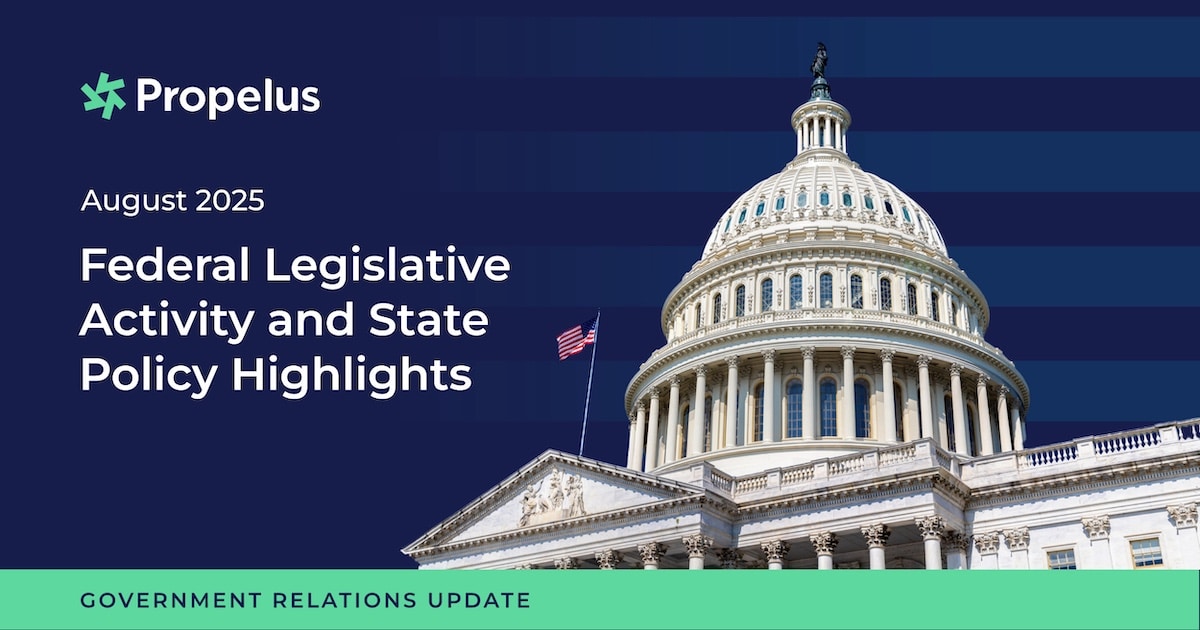
Welcome to our August Government Relations Update! This month, we’re diving into the latest federal legislative actions and significant state policy developments impacting healthcare. From telehealth to rural hospital support and the ever-evolving landscape of professional licensure, here’s a rundown of the key updates you need to know.
Federal Updates
Telehealth: The CONNECT for Health Act of 2025
Good news for telehealth! Representative Mike Thompson (D-CA) recently introduced the bipartisan CONNECT for Health Act of 2025 (H.R. 4206). This bill aims to permanently extend the telehealth flexibilities that proved so vital during the COVID-19 public health emergency. Without action, these provisions are set to expire on September 30, 2025.
Key provisions in the bill that will impact healthcare systems and providers include:
- Permanent Removal of Geographic Restrictions (§101): This means patients can access telehealth services from anywhere, no longer limited to rural or underserved areas.
- Expanded Telehealth Provider Eligibility (§103): Access to care is broadened by allowing a wider range of healthcare professionals to deliver telehealth services.
- Permanent Telehealth Authorization for FQHCs and RHCs (§104): Federally Qualified Health Centers and Rural Health Clinics will continue to offer and be reimbursed for telehealth services.
With over 150 organizations, including the American Medical Association (AMA) and the American Association of Nurse Practitioners, have publicly endorsed the CONNECT for Health Act.
Rural Health & Medicaid: Building on the OBBBA
Last month, we shared news about the launch of the Rural Transformation Fund under the One Big Beautiful Bill Act (OBBBA). This month, Senator Josh Hawley (R-MO) is building on that momentum with the introduction of the Protect Medicaid and Rural Hospitals Act (S. 2279). This bill is designed to reverse recent Medicaid funding cuts and provide better support for rural healthcare systems.
Here are the three major provisions of the bill:
- Lifts Provider Tax Limits: This repeals OBBBA-imposed restrictions on provider taxes, allowing states to continue using these taxes to access federal Medicaid funding for hospitals and providers.
- Restores State Flexibility in Medicaid Payments: Limitations set by the OBBBA on state-directed Medicaid payments would be reversed, empowering states to maintain strong reimbursement rates for healthcare providers.
Expands and Extends Rural Hospital Support: The Rural Health Transformation Fund would double from $50 billion to $100 billion and its duration would extend from 5 to 10 years, ensuring sustained investment in rural hospitals and access to care.
Artificial Intelligence
The Executive Office of the President released America’s AI Action Plan on July 10, 2025, outlining a comprehensive strategy for AI initiatives. Notably, several of these are directly aimed at improving healthcare. These improvements include streamlining administrative tasks, removing regulatory hurdles, optimizing hospital operations, enhancing fraud detection and cybersecurity, and strengthening clinical decision-making support. The potential for AI to transform healthcare is immense State-Level Shapers.
State Updates
We’re also keeping a close eye on key updates at the state level. Many full-time legislatures have been on recess and are scheduled to reconvene in late August or early September, including Wisconsin, Pennsylvania, and Ohio.
Nurse Licensure Compact (NLC) Updates – 2025
This year, eight states and the District of Columbia introduced legislation to join the Nurse Licensure Compact (NLC): Alabama, DC, Hawaii, Illinois, Michigan, Minnesota, Nevada, New York, and Oregon. As of now, only Michigan’s bill remains active. The Michigan House of Representatives passed the legislation earlier this year along party lines, and it’s currently under consideration in the state Senate. All other NLC bills introduced this year did not advance. California remains the only state that has yet to introduce NLC legislation.
Social Work Licensure Compact Update – 2025
As of August 2025, an impressive 28 states have enacted legislation to join the Social Work Licensure Compact, making it one of the fastest-growing interstate compacts in healthcare. This level of adoption was achieved in just 18 to 24 months. The compact is now in the implementation phase, with multistate licenses anticipated to become available in 2026. Early adopters include Missouri, Utah, Virginia, Georgia, Ohio, Minnesota, Arizona, New Jersey, and North Carolina, among others.
California – Certified Registered Nurse Anesthetists (CRNAs)
In California, Assembly Bill 876 (AB 876) is still under consideration. This bill seeks to provide legislative clarity by affirming that Certified Registered Nurse Anesthetists (CRNAs) are authorized to administer anesthesia independently when ordered by a physician or dentist, without requiring prescribing authority or additional supervision. The bill is currently pending in the Senate Appropriations Committee. With the California Legislature set to adjourn on September 12, 2025, it’s uncertain whether the bill will advance before the deadline.
Stay tuned for our next update as we continue to track these important developments!